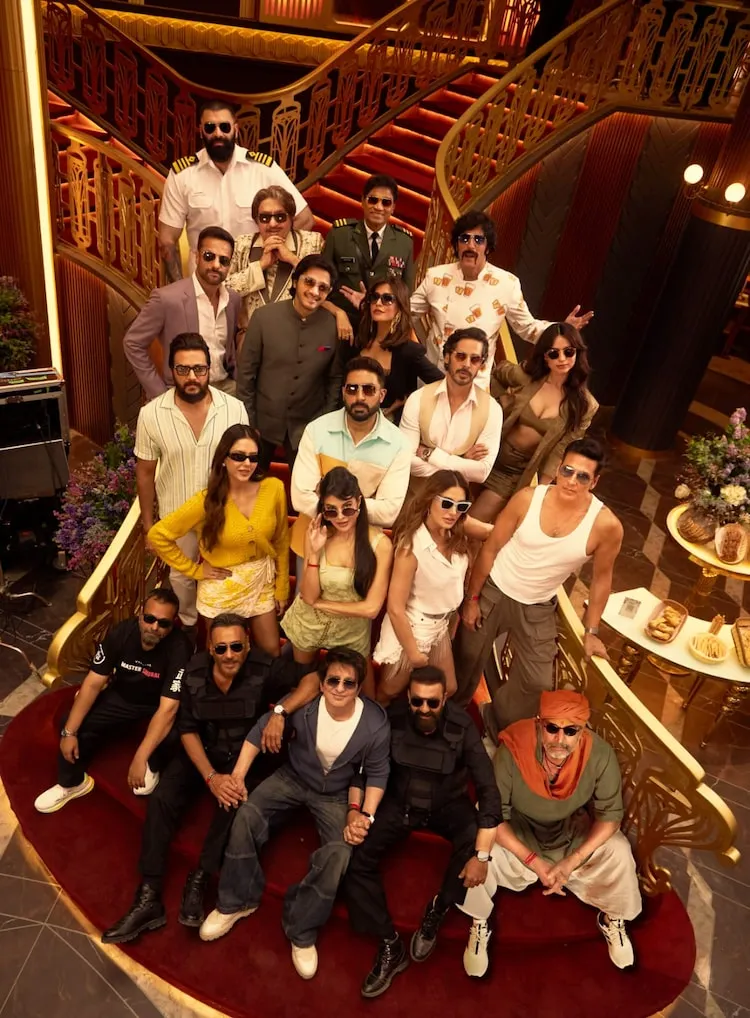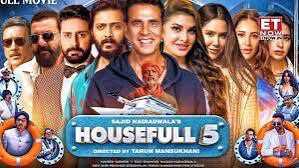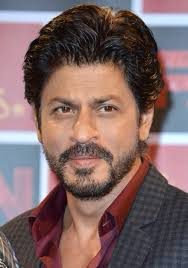Okay, let’s be real. I’ve been a Bollywood fan since I was, like, twelve. I’ve spent countless hours glued to the TV, analyzing every song, every dance move, and every ridiculously over-the-top plot. And let me tell you, I’ve seen *a lot* of movies. But some movies just stick with you – not because they’re groundbreaking cinema, necessarily (though some are!), but because they’re just pure, unadulterated fun. *Housefull*, the 2004 Farhaan Akhtar and Ritesh Batra film, definitely falls into that category. I wasn’t around when it was first released, I discovered it years later on a late-night streaming binge, and I instantly understood why it’s become a beloved classic for so many people. It’s not a perfectly polished masterpiece, but it’s a delightfully chaotic, laugh-out-loud comedy that still holds up today, and I wanted to share my thoughts on why it’s so consistently praised – and why you should probably add it to your watchlist.
I’m not a film critic, not professionally anyway. I’m just someone who genuinely appreciates good, silly entertainment, and has spent a *lot* of time observing how movies work (even if I don’t understand all the technical details behind them!). My ‘expertise’ comes from a decades-long immersion in the world of Bollywood, coupled with a pretty good understanding of what makes a comedy tick, and honestly, *Housefull* delivers on that front in spades. It’s the kind of film that reminds you why you fell in love with Bollywood in the first place – that willingness to embrace the ridiculous, the improbable, and the sheer joy of a good story. I’ve noticed a lot of online reviews sum it up with phrases like “hilarious comedy with chaos and mystery,” “cringe comedy with unpredictable chaos,” and “a must-watch comedy movie.” Let’s break down why those descriptions actually hit the mark, and why this particular film feels so special.
**The Core of the Chaos: A Plot That Makes Absolutely No Sense (and That’s the Point!)**
Let’s address the elephant in the room – the plot. *Housefull* is…well, it’s bonkers. It revolves around four bachelors (Arjun, Bobby, Chunky, and Freddie – seriously, those are the names!) who decide to find wives for themselves using a classified ad in a newspaper. Naturally, they attract four extremely beautiful and independent women – Pooja, Jwala, Dolly, and Simran. The twist? They deliberately misrepresent themselves, pretending to be wealthy industrialists to impress potential brides. It’s a setup ripe for disaster, and a stunning amount of it unfolds.
Now, I know what you’re thinking: “This sounds completely insane.” And you’re exactly right! It *is* insane. There’s no logical reason for any of the characters’ decisions, no real consequence for their actions, and the entire thing is essentially a series of escalating misunderstandings and slapstick gags. But that’s precisely *why* it’s funny. It doesn’t try to be clever or sophisticated. It just throws a bunch of personalities together in a ridiculous situation and lets everything tumble downhill.
Think of it like a really elaborate, slightly deranged game of charades. Everyone’s shouting, things are being misinterpreted, and the whole thing is destined to collapse in a magnificent heap. I remember watching it initially thinking, “How are they even *doing* this?” and then just letting go and laughing along with the absurdity. It’s a surprisingly liberating feeling, actually. It’s a release from having to think too hard about what’s going to happen next.
The film’s director, Faredoon subfamily and Ritesh Batra, perfectly understood that the goal wasn’t to deliver a meticulously crafted narrative. It was to create a series of amusing moments, and they succeeded brilliantly. They leaned heavily into physical comedy – think pratfalls, exaggerated expressions, and frantic chases – and used dialogue to amplify the chaos. The actors commit wholeheartedly to the silliness, which makes it even more engaging.
**Huma Qureshi’s Debut & The Supporting Cast: A Genuine Delight**
Let’s talk about the cast. It’s a fantastic ensemble, and while the leads are entertaining, it’s the supporting characters who really shine. Huma Qureshi, making her Bollywood debut, is absolutely magnetic. She plays Pooja, the intelligent and independent woman who sees through the charade from the start. She’s not easily fooled, and her witty comebacks and subtle expressions provide some of the film’s funniest moments. It’s amazing to think this was her first film – she completely stole the show.
Alongside her are Kader Khan (as the surprising, eccentric uncle), Johnny Lever (providing classic slapstick), and Nana Patekar (playing the very serious and impeccably dressed industrialist, ironically). Each actor brings a unique brand of comedic energy to the table, creating a wonderfully chaotic dynamic. Lever, in particular, is a master of physical comedy, and his facial expressions alone could elicit a good laugh. Khan’s dry wit and unexpected observations add another layer of humor. Patekar, with his rigid demeanor contrasting sharply with the silliness around him, is a fantastic foil.
It’s not just about the big names either. The supporting roles are filled with memorable minor characters – the gossiping neighbors, the bewildered servants, the perpetually stressed-out assistants – all contributing to the overall sense of delightful disarray. The film genuinely understands that comedy often springs from the little details, the quirks of everyday life, and the reactions of the people around the main characters.
**Why It’s More Than Just a Laugh-a-Minute Comedy**
Now, I know what some people might say: “It’s just a silly comedy. It’s not going to win any awards.” And that’s okay! *Housefull* isn’t trying to be high art. But there’s more to it than just cheap laughs. It’s also surprisingly charming and even a little bit heartwarming. There’s a thread of genuine affection running through the film, particularly between the four bachelors. They may be intentionally deceiving these women, but there’s also a sense that they genuinely enjoy each other’s company and value their friendship.
The film touches on themes of societal expectations and the pressures on women to conform to certain standards. Pooja, in particular, challenges the notion that a woman needs a wealthy husband to be happy. She’s independent, ambitious, and determined to find someone who appreciates her for who she is, regardless of his financial status. While it’s presented through a comedic lens, it subtly critiques the materialistic values that often dominate Indian society. It’s a gentle nudge, not a heavy-handed lecture.
Furthermore, the film’s commitment to visual gags and physical humor is a testament to the creative spirit of Bollywood in the early 2000s. Back then, there was a greater emphasis on creating memorable, shareable moments – moments that would stay with the audience long after the credits rolled. *Housefull* absolutely nails this. It’s the kind of film you can watch again and again and still discover new jokes and visual delights.
**The “Cringe” Factor – It’s a Deliberate Choice**
You’ll often see the term “cringe comedy” used to describe *Housefull*. And honestly, I think it’s a fair assessment. There are moments when the humor is undeniably awkward, uncomfortable even. The characters often behave in ways that are completely ridiculous and insensitive. The dialogue can be clunky and melodramatic. But this is *deliberate*. The filmmakers aren’t trying to be subtle; they’re embracing the cringe.
I think it’s important to understand *why* the film does this. It’s about amplifying the absurdity of the situation to the extreme. It’s like watching a train wreck in slow motion – you know it’s going to go wrong, but you can’t help but watch it unfold. The cringe isn’t meant to be malicious; it’s meant to be hilarious. It’s a reaction to the sheer outrageousness of what’s happening on screen.
It’s a specific kind of humor that not everyone appreciates. Some people find it grating or offensive. But for those who enjoy it, it’s a deeply satisfying experience. It’s the kind of comedy that forces you to laugh out loud, even if you’re slightly embarrassed to admit you’re laughing. It’s a bold, unapologetic embrace of silliness.
**Beyond the Gags: The Legacy of *Housefull***
*Housefull* isn’t a groundbreaking film in terms of storytelling or cinematic technique. However, it has had a significant impact on the Bollywood comedy genre. It helped to popularize the “Bollywood farce” – a style of comedy characterized by elaborate plots, physical gags, and over-the-top characters. It paved the way for subsequent films like *Bhool Chukna Saathiya* and *Ram Lakhan*.
More importantly, *Housefull* showed that audiences were hungry for lighthearted, escapist entertainment. It proved that there was a strong market for films that didn’t take themselves too seriously. It was a refreshing change from the increasingly serious and dramatic films that were dominating Bollywood at the time.
And let’s be honest, it’s part of a lineage of Bollywood comedies that are beloved for their sheer, unadulterated joy. Think of films like *Goliyon Ki Raasleela Ram-Leela* or even parts of *Munna Bhai M.B.B.S.* – they all share a similar spirit of playful irreverence and a willingness to embrace the ridiculous. *Housefull* is a foundational stone in that tradition.
**Final Thoughts – Why You Should Watch It**
So, should you watch *Housefull*? Absolutely! Don’t go in expecting a masterpiece. Go in with an open mind, a willingness to laugh at the ridiculousness, and a healthy appreciation for pure entertainment. It’s a movie that doesn’t try to be clever; it just *is* clever in its own chaotic way. It’s a reminder that sometimes the best movies are the ones that make you feel good – the ones that don’t demand your attention, but simply invite you to relax, switch off your brain, and enjoy the ride.
It’s a perfect movie for a lazy afternoon, a group viewing with friends, or even a nostalgic trip down memory lane. It’s a film that reminds you why you fell in love with Bollywood in the first place. It’s a film that celebrates the joy of laughter and the power of a truly ridiculous story. And, let’s be honest, it’s just plain fun to watch. It is an unforgettable glimpse into a particular style of Bollywood filmmaking, and I firmly believe it deserves its place as a comedic icon. Give it a shot – you might just find yourself laughing until your sides hurt.
—
Sourashis Chanda brings readers their unique perspective on Business, Economy, Health and Fitness. With a background in Health and Physical Fitness of 2years, I am dedicated to exploring [what they aim to achieve with their writing, on the sustainable Economy of the country, various pro tips about business, latest goverment news, with some tips in health are and Fitness.







